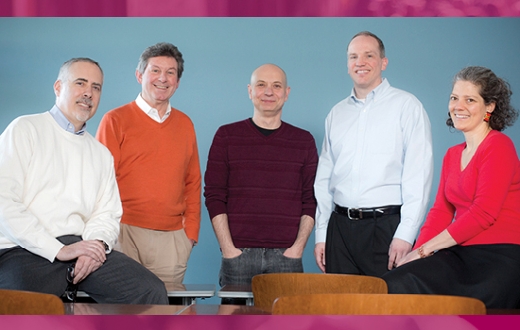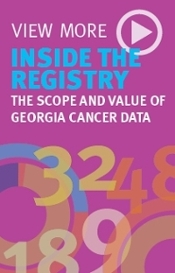Is a woman's ability to have children compromised after cancer treatment, and should she be counseled to freeze her eggs? Is robotic prostate surgery less likely to result in impotence? Are women with breast cancer who are on Medicaid getting the recommended treatment? Help in answering these and other important questions can be found within an immense database: the Georgia Cancer Registry.
Housed in the Rollins Department of Epidemiology, the Georgia Cancer Registry collects information on each new diagnosis of cancer within the state and contributes these data to two national databases—the National Cancer Institute's Surveillance, Epidemiology, & End Results Program and the Centers for Disease Control and Prevention's National Program of Cancer Registries.
"The major mission of the registry, or any surveillance system for that matter, is to do descriptive epidemiology," says Kevin Ward, who oversees the registry as director of the Georgia Center for Cancer Statistics. "It allows us to follow cancer trends over time and identify cancer patterns in various populations within Georgia.
"But the real value of the registry is how it's used for research," Ward continues. "I'm not sure everyone realizes what an incredibly rich resource we have here."
In fact, having the registry here helped Winship Cancer Institute of Emory University earn and retain its distinction as an NCI-designated cancer center. "The registry is an invaluable resource for Winship and our investigators," says Walter J. Curran Jr., Winship's executive director. "But it goes far beyond that. Investigators from around the country turn to it. The Georgia registry is uniquely diverse and aligned with experienced faculty researchers at Rollins. This alignment creates a powerful tool in the fight against cancer."
The diversity to which Walter Curran refers reflects the demographics of Georgia, with its large, diverse population—both urban and rural as well as poor, middle-class, and wealthy. The Georgia registry is one of the few with a large African American cohort as well, making it an invaluable resource when studying racial disparities in cancer incidence, care, and outcomes.
Beyond surveillance, the registry offers researchers a pool from which to draw participants for studies. "When researchers recruit subjects from a cancer center or hospital, they just get a sample that reflects that particular center's population," says Ward. "The registry, however, mirrors the general population, so researchers are able to generalize their findings."
The Georgia registry can also be linked to other data sources, such as Medicare and Medicaid. Such links allow researchers to look at things such as cost of care, quality of care, and outcomes other than mortality.
"Because of the registry, we know the frequency of each type of cancer, whether it is going up or down, who is most affected, and how quickly and accurately cancers are diagnosed and treated," says Rollins Dean James Curran. "It gives us clues as to the causes of cancer and also to the causes of bad outcomes of cancer. The registry does all of this for every citizen of the state, and that's a very valuable resource to the doctors who care for people, to the researchers who study cancer, and to the patients themselves.


